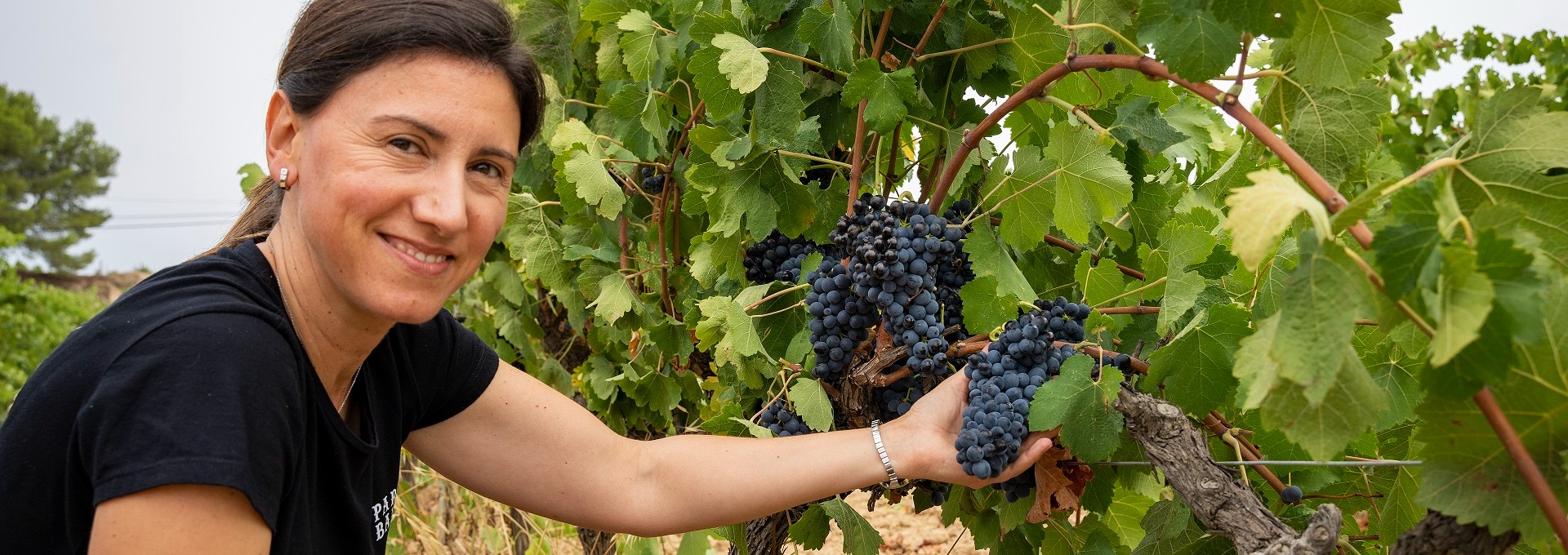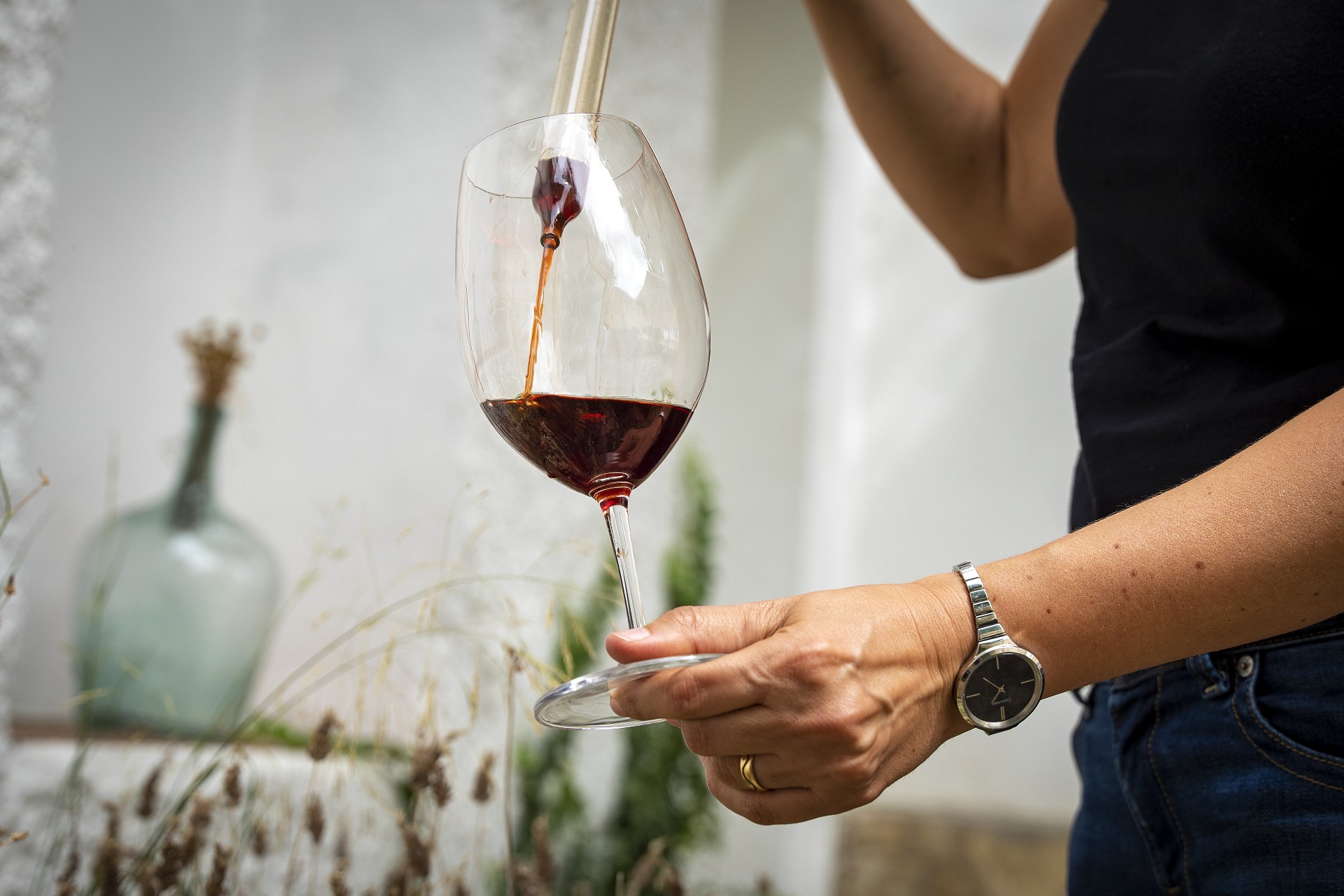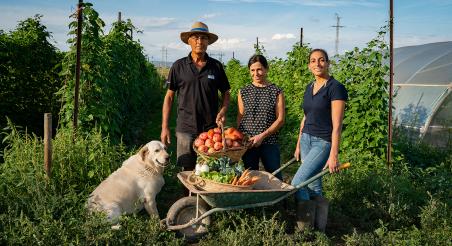Marta Casas (Vilanova i la Geltrú, 1976) came to Parés Baltà by a twist of fate and driven by love: she fell in love with Josep Cusiné, one of Can Baltà's sons. With a pharmaceutical background, he decided to study oenology to better understand what was in his hands every time he picked up a glass of wine. When Marta joined the family business, in addition to her husband, two brothers-in-law already worked there: Maria Elena and Joan. She joined under the premise of making wines and cavas in a completely natural way, as "grandfather", Joan Cusiné Hill, had wanted. Marta was surprised when her grandfather told her that he wanted the must fermented with only a small amount of preservative and that was enough, and that "he could forget everything he had been taught about oenology". At that time, he felt like starting over, and he also understood that grandfather had always made organic wines, but without saying it.
What were the vineyards of Parés Baltà like when you arrived?
The grandfather, at the age of eighty-two, still took care of the vineyards, working without pesticides or herbicides, in the most natural way possible. "No chemistry", as he used to say. And considering that I am a pharmacist, and my sister-in-law, a chemical engineer, the poor man must have thought: "These two take my cake." Maybe that's why, from the beginning, he told me to forget everything I had been told at Enology school and to do the same as he did: to use the farm's animals to act as natural herbicides and apply as little sulfur and copper as possible.
I don't know what "conventional agriculture" means, I've never applied it. I studied it, of course, because they teach you, but I never use any conventional procedures in my work. When I started at Parés Baltà, they were already working on organic, and right at that moment they started processing all the documentation to obtain the certificate and be able to label the wines as organic.
Did you introduce more changes together with the grandfather? Born in 1917, Joan Cuisiné Hill died in 2010. Was he able to live through the transition from the winery to biodynamic agriculture?
Exactly the year that grandfather died, my brother-in-law found out about the existence of a group in Catalonia, near Igualada, that was practicing something called “biodynamic agriculture”. Since he travels a lot and works with importers, he had already noticed the "Demeter" label on some wine bottles, and he told us that it was very popular in Germany.
He then suggested that my sister-in-law take the biodynamics course, assuring her that she would understand everything perfectly, thanks to her scientific background. I read the course syllabus and saw that it addressed concepts such as subtle energies, the forces of the cosmos, and the rhythms of nature and the moon, the life energy of food, the structure of the soil and organisms- farm, among other very peculiar subjects. Finally, a few decided to attend, lest they be "brainwashed".
«I don't know what "conventional agriculture" means, I've never applied it. I studied it, of course, because they teach you, but I never use any conventional procedure in my work» Marta Casas
Were there prejudices about training in biodynamic agriculture?
Of course! And, in fact, there are still people today who see this way of farming as distorted, but out of ignorance. It's funny, because now I'm a professor of biodynamics and they tell me that the people who practice it "are esoteric, half witches who look at the sky and the moon, hippies who do rituals and dances to make it rain and even bury stuffed cow horns with manure".
At the beginning, I was also very skeptical and, when the colleagues who had attended the trainings explained to me what they had learned, I did not understand anything. They told me about rhizomes, vegetable covers, legumes that fix nitrogen, and I thought they had lost their minds... Think I came from the Pharmacy field. But in the end I decided to study biodynamic agriculture, partly because I saw my father-in-law so enthusiastic that he wanted to know how bad we would die if he was told between our eyebrows that we had to work the vineyard according to biodynamic principles. But I went there thinking that they would make me perform strange rituals and go out at night to look at the moon.
What did you find in the course? What surprised you the most about the biodynamic training?
First of all, I was surprised by the way the course content was structured. It was apparently very messy... From chapter 1, they jumped to 8 and then to 5... All the explanations were done in a circle, without shoes and in the field. I had a hard time reading the book and it never happened to me before that I had to go back to understand what I was reading.
Afterwards, I realized that biodynamics is explained in a spiral way, and that the theoretical explanation follows the pattern of what we do when we make biodynamic preparations: we prepare a dynamism to give life to the earth or the plant and transfer this information from prepared in the water that we will apply later. We dilute the product in water and create a vortex, turning it several times. We create chaos so that, when finished, balance will be formed again. And biodynamics is taught in the same way: chaos alternates with balance because, if you don't do it that way, there is a centrifugal force that pushes you out.
In fact, Rudolf Steiner, the father of anthroposophy, wrote those very complex books on biodynamics to make the discipline accessible to those who are really at a time in their lives to understand it.
Do you think that anthroposophy is a good complement to science?
Certainly. When I teach, I always point out that biodynamics is based on anthroposophy, which is the in-depth knowledge of the anthropos, the human being, but it goes further. If we stayed only with anthroposophy, the discipline would be impractical and too philosophical.
Instead, if we combine anthroposophy with empiricism, with a knowledge of nature that includes mathematics, biology, and chemistry, we understand everything much better. Natural chemical processes happen to wine: there are yeasts that transform sugar into alcohol. Well, before, the ancients thought that this process was magic! But no, it's science! Therefore, if we observe nature, as Steiner did, biodynamic practice will always be a complement to science.
«When I teach, I always point out that biodynamics is based on anthroposophy, which is knowledge. But if we stayed only with anthroposophy, the discipline would be impractical and too philosophical» Marta Casas
What has biodynamics brought to you in your work as a farmer and winemaker? And in your personal life?
I am extremely proud to have come to understand biodynamics, to be part of this family, to create a product that comes from the earth and that, on top of that, brings pleasure. Wine is a food that, in moderation, allows us to enjoy and gives us the satisfaction of understanding the territory, nature. It also gives us the opportunity to find out who made it and where it came from. Grenache produced here is not the same as in the south of France or Australia.
I love biodynamics and anthroposophy, and if I can also combine them with the scientific knowledge I have and understand the cosmic rhythms, it's wonderful. For example, I now know that each plant has its own cycle and is related, in turn, to the cycle of a different planet. I am so happy, proud and deeply grateful for what is happening in my life that I am completely happy to have come this far. If before I thought I had arrived at Parés Baltà by chance, now I think it was a coincidence.
«I love biodynamics and anthroposophy, and if I can also combine it with the scientific knowledge I have and understand cosmic rhythms, it's wonderful» Marta Casas
Do you want your children to remain connected to the world of wine and agriculture?
Soon it will be their turn to think about the future and choose whether they want to study Baccalaureate or training courses. I just tell them that studying means knowing, and that doing so will give them more freedom of opinion, more freedom of knowledge, and more freedom to explore the world and live fully.
Anthroposophy invites us to observe, think, feel and act. And what do we normally do? We just act, and we do it without feeling, thinking or observing.
I encourage them to take advantage of the opportunities presented to them and to follow their feelings without fear of making mistakes, because nothing happens if mistakes are made. You don't lose a year or lose anything, but experience and knowledge are gained.
Do you have a favorite wine?
Yes and no. Yes, because obviously, like any human being, you always opt for a style, but this style keeps changing. And besides, all wines are like children to me. Maybe there is one that is the most handsome and another that is a little more lame, but each has its character and its moment.
How many types of wine do you make?
When I started, we had about seven or eight wines, and now we make a total of fifty. With 200 hectares of vineyards spread throughout the Penedès, at different altitudes and microclimates, we have the opportunity to create a great diversity of wines. Although, with the practice of biodynamics, we produce less, this methodology allows us to play.
What future do you foresee for the vineyards and wines of Alt Penedès?
In Penedès, there is a revolution. It will not be a transition from today to tomorrow, but it is a change that must be valued and that will bring us a very good future for the area.
People usually associate the style of wine with the area where it is produced. For example, they relate a Bordeaux wine to the Merlot and Cabernet blend.
But Penedès has always been a garden of diverse varieties. There is now a significant increase in organic wine production in the region because if you want to be at the top of the wine rating pyramid, you have to be organic. In Penedès, approximately 70% of winegrowers already follow organic practices, and during the last Barcelona Wine Week, the president of the Penedè Denomination of Origin stated that in 2030 we will be the first DO in the world with 100% of organic production. It is a possible and achievable goal.
In addition, another revolution is underway here: a more manual pruning technique is being adopted that is much more respectful of the vine, because it has been observed that the mechanization of the field has aged the vines. Significant improvements are being made. It is harvested more by hand and pruned with respect, looking to ensure that the flow of sap is not obstructed. These practices allow the vineyards to have a longer life and allow us to aspire to be a great region, what is called " Make Penedès great again ". We can make Penedès great again in terms of quality, and not in kilos. And quality is achieved by doing things more manually, without abusing the plants mechanically or using chemicals.
«In Penedès, there is a revolution. It will not be a transition from today to tomorrow, but it is a change that must be valued and that will bring us a very good future for the area» Marta Casas
You have gone from being a pharmacist to an oenologist and farmer. In your journey from the laboratory to the field, what would you highlight?
I have taken off my white coat because I believe that the winemaker must step on the vine. White is for the laboratory, while here we are creating living matter that evolves inside the bottle.
There needs to be a mental revolution and recognize that the winemaker must also be attentive to the vineyard and make decisions in the field. We will make good wine if we have quality raw material! If not, we will have to use many mechanisms to make it good and add things that, although approved at the health level, are not healthy for our body. In short, if you make the right decisions in the vineyard, you won't need to tweak the wine.
In fact, if we follow anthroposophic principles, things would improve in all areas: politics, economics and social relations, among others. If we eat well, we will have a clearer and more awake head to make the right decisions. My biodynamics professor used to say that if politicians and economists ate living, vital elements, they would incorporate this energy vibration and we would be a different society.
How does this revolution culminate in the Penedès?
The third aspect of the revolution is to mitigate climate change, and we are taking action. We farmers see that we have to do something now that we have no water at all and the temperatures are rising. And we are acting! We have recovered ancestral varieties, which adapt to climate change, and we are planting them.
With the temperatures getting higher and higher, we have to harvest the grapes earlier and the harvest is moving forward. We have found that the traditional indigenous varieties of the area are the ones that come out the best, while the imported varieties, from colder regions, are no longer working. In addition, we learned manual techniques to make the most of the harvest and local varieties.
We can no longer focus on producing large quantities of grapes or having so much wine left over. Nor can they maintain such low prices... We must restore the prestige of the Penedès wine-growing areas. Although this is a slow revolution, we are headed for these changes as there is no turning back.
«We can no longer focus on producing large quantities of grapes or have so much wine left over. Nor can they maintain such low prices... We must restore the prestige of the wine-growing areas of the Penedès» Marta Casas
How do you see the role of women in wine farming?
The figure of the woman has always been in the vineyard, but she was often invisible. Many women did not dare to expose themselves in public, and all recognition was directed to their husbands. We made a wine in honor of "grandmother", Rosa Cusinell, who lived to be one hundred and one years old. He died in 2021.
I remember that, when I showed him that we had dedicated a wine to him, he said: "Don't take me anywhere. I am nobody! It's the owner who has to leave." How do I love him? The master was her husband, and when he died, her son! I told her that without her we wouldn't have the vineyards we have. That is why I am so grateful to be able to work with this raw material and in these lands, which are our diamond. And we were able to achieve all this thanks to her.
Beyond the grandmother, I am aware that there are many women working behind the scenes who have suffered a lot, even discrimination. Now, however, in the world of wine, the role of women is much more valued and we are recognized for our ability to care and protect. Women have a different sensibility. Not better or worse than men, just different.
Wine is tasted, smelled and looked at. Is it also heard? Does the spirit of wine speak to you?
The plant has no feeling, but it does have birds and insects that surround it and they are the ones who bring the emotional energy to the plant, because they go to the leaves, pollinate it and spread the seeds. And if it's bees, so is the pollen. It is the birds and the insects that give the soul to the plant.
The spirit of the wine speaks to you first in the vineyard, when we observe it. If the winemaker wants the wine to have a soul, to transmit, to express, and, when tasted, to say where it comes from and reveal its character, you must have listened to him. When this happens, it is because someone has been behind that bottle and present in that vineyard, watching and listening carefully to everything.
Behind a bottle of wine, a glass, hides a whole history, a land, a variety, people who think and the imprint of how it has been worked.
When I enjoy the wine cycle the most is when I'm in company, tasting the wines, even with people who have various intolerances, and they tell me: "Your wine tastes so good to me!". At this moment, I feel full.
— BCN Smart Rural Editorial —




